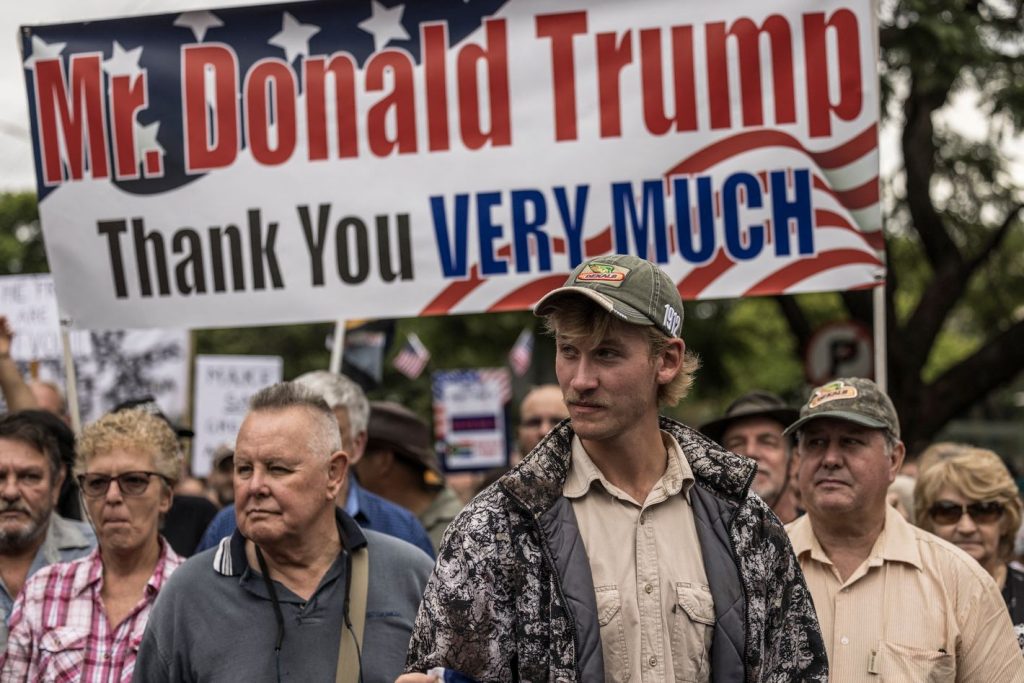Photo: Marco Longari/AFP/Getty Images
It’s hardly news that Donald Trump uses over-the-top rhetoric to inflate his many boasts of world-historical greatness and to smear his opponents. Not even his biggest fans would argue that he uses language with great precision (which is why it is often said they “take him seriously, not literally”).
But even the lowest of expectations cannot forgive the abuse of language the president committed during a press availability today in defending his creation of refugee status for white South African farmers even as he is closing the door on refugees from virtually everywhere else. Asked why he was “creating an expedited path into the country for Afrikaners but not others,” Trump replied:
Because they’re being killed, and we don’t want to see people be killed … But it’s a genocide that’s taking place that you people don’t want to write about, but it’s a terrible thing that’s taking place.
Farmers are being killed. They happen to be white. But whether they’re white or Black, makes no difference to me; but white farmers are being brutally killed and their land is being confiscated in South Africa, and the newspapers and the media, television media doesn’t even talk about it. If it were the other way around, they talk about it. That would be the only story they talk about.
REPORTER: Why are you creating an expedited path into the country for Afrikaners but not others?
TRUMP: Because they’re being killed. And we don’t want to see people be killed … it’s a genocide that’s taking place. Farmers are being killed. They happen to be white. pic.twitter.com/8LV3VmZ296
— Aaron Rupar (@atrupar) May 12, 2025
It’s characteristic that Trump wrapped his howler of a factual assertion in an accusation of media racism against white people, the only kind of racism he is able to acknowledge. But let’s not get too distracted. The president of the United States is grossly misusing a term that should be strictly reserved for the worst outrages of human cruelty: genocide.
While there has always been controversy over how exactly to define it, the 1948 United Nations Genocide Convention offered probably the broadest definition available:
In the present Convention, genocide means any of the following acts committed with intent to destroy, in whole or in part, a national, ethnical, racial or religious group, as such: (a) Killing members of the group; (b) Causing serious bodily or mental harm to members of the group; (c) Deliberately inflicting on the group conditions of life calculated to bring about its physical destruction in whole or in part; (d) Imposing measures intended to prevent births within the group; (e) Forcibly transferring children of the group to another group.
It’s hard to see how the land-redistribution project of the South African government, which is what has triggered Trump’s wrath, meets any of these criteria. Here’s the requisite background from the New York Times:
Although white South Africans make up only 7 percent of the population, they own farmland that covers about half of the country. That is indicative of a broader prosperity gap, with white South Africans enjoying much higher employment rates, lower poverty rates and more lucrative wages than their Black counterparts.
The government’s efforts to redistribute land after apartheid have largely fallen flat because of a variety of factors, including corruption, a lack of financial support for Black farmers and the inability to get enough white South Africans to voluntarily sell their land.
This year, South Africa’s president, Cyril Ramaphosa, signed into law a measure that gives the government the ability to take private property without paying compensation. Although legal experts say uncompensated seizures are subject to strict judicial review and are likely to be rare, Afrikaner community leaders have expressed fears that white farmers will have their land taken from them.
Post-colonial (and for that matter, post-feudal) land-redistribution policies are hardly all that unusual, and while it’s possible to question their wisdom or fairness, they do not inherently cry out to heaven for vengeance. And they do not constitute “genocide.” Trump’s claim that Afrikaner farmers are being “killed” in a genocidal fashion are largely hallucinatory, as the BBC reports:
Between April 2016 and March 2017, 74 people — of all races — were murdered on farms in South Africa, according to police figures, compared to more than 19,000 murders nationwide in the same period.
The BBC has found that there is no reliable data to suggest farmers are at greater risk of being murdered than the average South African.
Even the legitimate fears of Afrikaners that they could lose their land without compensation remain more hypothetical than real, since the South African government has not moved to implement the expropriation law. But in any event, losing land, however painful or unjust, is not by any reasonable definition “genocide.” And Trump must grasp that, since his focus has been on vague claims of rampant “killings.”
The bottom line is that there is more than enough organized and murderous violence against vulnerable groups in this world to merit a discussion of “genocide” without extending it to Afrikaners, particularly by a U.S. administration that is busy closing doors to actual victims of actual violence near and far. The U.S.-based organization Genocide Watch, which has a highly sophisticated evaluation system for activities that constitute or threaten genocidal violence, listed 17 countries that merited genocide “emergencies or warnings” in 2024. None of them were South Africa.
We have no way of knowing whether Trump’s terrible misappropriation of the term “genocide” for South Africa was borrowed from his friend and operative, the South African immigrant Elon Musk, who has used it himself with his usual lack of inhibition. But they should both cut it out lest they empty the word of any meaning.

